Mental-Health and Well-Being
Wellbeing Statement
At Buckingham Primary School, we promote positive mental health and wellbeing for our whole school community: pupils, staff, parents and carers. In the same way as physical health, we recognise the importance of mental health to our lives. We know that children’s mental health significantly impacts their overall wellbeing and can affect their learning and achievement. All children go through ups and downs through their school life and some face significant life events. Our role in school is to ensure that children are able to manage times of change and stress, be resilient, are supported to reach their potential and access help when they need it. We also have a role to ensure that pupils learn about what they can do to maintain positive mental health, what affects their mental health, how they can help reduce the stigma surrounding mental health issues and where they can go if they need help and support.
What we are doing well
A strong and effective culture of wellbeing focused on a relationship-based approach and centering on our school values.
Attachment Aware Schools Award Programme
The Attachment Aware Schools initiative is supported by international research, demonstrating that whole-school attachment-based strategies are effective in reducing behavioural challenges, sanctions and exclusions while improving outcomes for all students, particularly the most vulnerable. Achieving for Children (AfC) Virtual School’s Attachment Aware Schools Award programme supports schools in embedding attachment aware and trauma-informed practices, through a year-long programme that includes audits, action plans, whole-school training, and continuous coaching from AfC Educational Psychology services.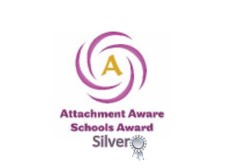
Buckingham Primary school are proud to have been awarded the Bronze Attachment Aware Schools Award for 2022/2023 and the Silver Attachment Aware Schools Award for 2023/2024. We continue to develop our attachment aware practices this academic year as we work towards achieving the Gold Award.
Emotion Coaching is way of helping people, children and adults, to understand the different emotions they experience, why they occur and how to handle them. John Gottman (1977)
Through our work entitled the CALM project, Buckingham Primary School have applied attachment aware principles including emotion coaching practices based on research of John Gottman (1977) to develop a Relationship-based behaviour policy.
This work is underpinned by the development of key resources including emotion coaching scripts worn on staff lanyards and the development of CALM spaces through the school to support emotional regulation. The work has also included the introduction of Pupil Passports which summarise important information for key pupils in order to ensure a consistent, relationship-based approach to support delivered across the school
In order to support a systemic approach to its implementation, we have extended these principles and practices to the wider school community through the delivery of targeted training for families. Please see below the information and resources shared at our Recent parent workshop ‘ How to support your child’s behaviour using Attachment Aware Principles’.
Attachment Aware Principles Workshop
Attachment Aware Principles - Supporting resource
Zones of Regulation
The Zones of Regulation is an evidenced-based programme which organises feelings, states of alertness, and energy levels into four coloured Zones – Blue, Green, Yellow, and Red.
- Blue Zone: Low states of alertness, such as feeling sad, tired, bored, or sick. It indicates a need for energy or rest.
- Green Zone: Optimal state of alertness, where one feels calm, focused, and ready to learn. This is the desired zone for most learning and interaction.
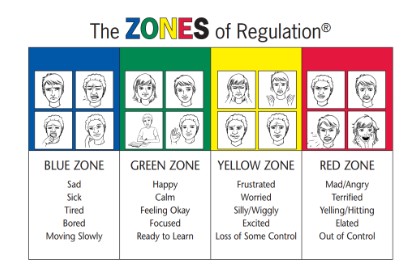
- Yellow Zone: Elevated alertness, where one may feel frustrated, anxious, excited, or silly. This zone indicates a need for caution and self-regulation to prevent escalation.
- Red Zone: High states of alertness, such as anger, fear, or intense excitement. This is a zone where emotions can feel out of control and require significant regulation
Through targeted Zones of Regulation intervention groups, children develop their emotional literacy as they are taught to effectively express their emotions as well as how to use specific ‘tools’ to support their self regulation. The visual structure of The Zones of Regulation helps to make the complex skill of regulation more concrete for all learners, but particularly many with SEND, and those who support them. By understanding their emotional states and how to adjust them, children are supported to develop both emotional well-being and academic success.
A Low-Arousal Communication Friendly Environment
Buckingham Primary School have utilised the support of the Richmond Speech and Language Service to provide a low-arousal communication-friendly environment. Environments are calm and ordered in such a way so as to reduce anxiety and aid concentration. We aim to ensure as few distractions as possible, paying attention to noise levels, colour schemes, odours, lighting and clutter, for example. By minimising visual distractions, we create a space where children can better concentrate on their learning. The use of visual aids, such as symbols and timetables used widely throughout the school , can support all children but in particular multilingual learners and children with SEND. These adjustments not only enhance understanding but also contribute to a more inclusive and supportive learning environment for allCALM Spaces and Regulation Stations
At our school, we believe that providing calm spaces and regulation stations plays a vital role in helping children manage their emotions and get ready for learning. These areas offer students a quiet, comfortable space where they can step away from the classroom environment to calm down, reflect, and regulate their emotions.
CALM Zones:
These areas are inside each of our classrooms and are a part of the attachment aware approach. These areas provide a safe space for children to access whenever they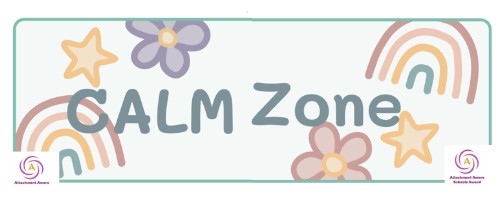 need to. By using tools such as sensory items, breathing exercises, and calming visuals, children are encouraged to identify their feelings and choose strategies to help them return to the optimal 'Green Zone' for learning. These spaces are particularly helpful for children who may feel overwhelmed, frustrated, or anxious, as they provide a safe place to reset and regain focus.
need to. By using tools such as sensory items, breathing exercises, and calming visuals, children are encouraged to identify their feelings and choose strategies to help them return to the optimal 'Green Zone' for learning. These spaces are particularly helpful for children who may feel overwhelmed, frustrated, or anxious, as they provide a safe place to reset and regain focus.
Regulation stations:
Each regulation station is equipped with various exercises linked to the Sensory Circuits programme, designed to either alert, organise, or calm the body and mind. 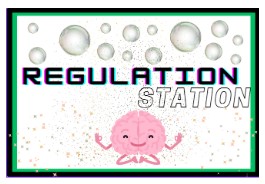 Children can choose to do one of each type of exercise for a full reset, or they can select a specific activity depending on their current emotional state. For example, if a child is in the 'Blue Zone' and feeling low energy, they can engage in alerting activities to boost their focus. If they are in the 'Yellow Zone' and feeling heightened or anxious, calming exercises will help them regulate.
Children can choose to do one of each type of exercise for a full reset, or they can select a specific activity depending on their current emotional state. For example, if a child is in the 'Blue Zone' and feeling low energy, they can engage in alerting activities to boost their focus. If they are in the 'Yellow Zone' and feeling heightened or anxious, calming exercises will help them regulate.
Mental Health Support Team
Buckingham Primary School have been a part of the Richmond Cluster Mental Health Support Team Trailblazer Project since 2020. Through the progamme, we have extended our mental health support offer in the school for pupils, staff and parents including the support services below.
For further information, please contact our Designated Mental Health Lead, Ms. Morris, at info@buckingham.richmond.sch.uk or see our Welling Policy in the Policies section.
Please find the link below to the upcoming Mental Health Support Team's Webinar series for parents and carers, Helping Children with....
Helping Children with...webinar series for parents and carers 2024 - 2025
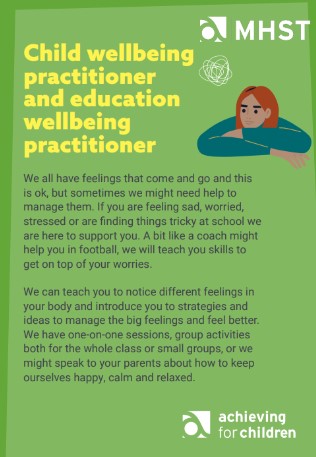
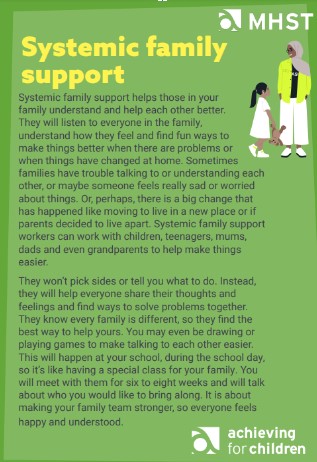
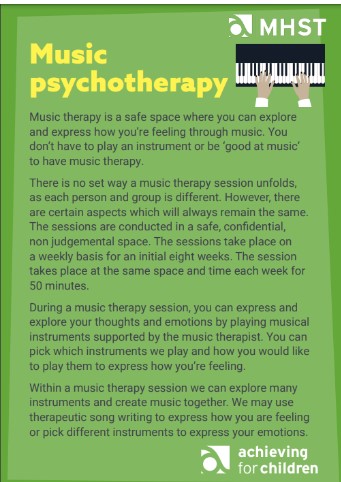
On-site Trauma Specialist and Arts Psychotherapist one day per week
Claire is an allied health professional and state regulated Arts Psychotherapist with over twenty years experience working with children and adults in a variety of settings .
Claire is trained in several trauma modalities including CATT (Children’s Accelerated Trauma Treatment. Her specialist area of work is in neurodiversity and complex trauma. The art therapy service at Buckingham School is catered for all individuals and families. The aim of the service is to provide bespoke trauma informed psychological assessment and treatment for children using arts and play, whilst also providing support for their parents/carers through psychoeducation.
Purple Elephant Charity
Buckingham Primary School works closely with the Purple Elephant Project Charity - a children’s mental health charity working across the London Boroughs of Richmond and Hounslow. They provide support for children and their families affected by 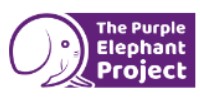 attachment, developmental trauma or life experiences. Through specialist therapeutic services such as Play Therapy and Art Therapy, they work to transform lives, enabling children to reach their full potential and a brighter future. Buckingham school is proud to work alongside this amazing organisation. Last year we took part in their ‘Wear Purple’ day and raised over £500 to support children and families that are supported by the charity. https://thepurpleelephantproject.org/
attachment, developmental trauma or life experiences. Through specialist therapeutic services such as Play Therapy and Art Therapy, they work to transform lives, enabling children to reach their full potential and a brighter future. Buckingham school is proud to work alongside this amazing organisation. Last year we took part in their ‘Wear Purple’ day and raised over £500 to support children and families that are supported by the charity. https://thepurpleelephantproject.org/
Ukrainian Bilingual Education Support Worker from St. Mary’s Ukrainian School We have been allocated Ukrainian Bilingual Education Support Worker from St. Mary’s Ukrainian School who works with us on-site on a weekly basis to provide support for our Ukrainian children and their families.
Emotional Literacy Support Assistants (ELSAs) The Emotional Literacy Support Assistant (ELSA) training has been delivered by the Educational Psychology Service across Kingston and Richmond since 2010. At Buckingham school, we have two trained (Emotional Literacy Support Assistant) teaching assistants. Our ELSA support can benefit children who may be experiencing 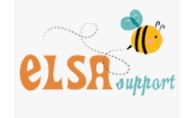 anxiety, low self-esteem, difficulties in managing friendships, or challenges in regulating their emotions. It is particularly helpful for children dealing with significant life changes such as bereavement, family breakdown, or moving to a new school. Through one-on-one or small group sessions, our trained ELSAs provide targeted support in areas such as emotional awareness, social skills, self-regulation, and resilience-building. The aim is to equip children with the tools they need to understand and manage their emotions, improve their social interactions, and feel more confident in school. ELSA support plays a crucial role in creating a positive learning environment, helping children who may otherwise struggle to engage with their education. By addressing emotional needs, it allows students to feel more settled and ready to learn, ultimately supporting their academic and personal growth
anxiety, low self-esteem, difficulties in managing friendships, or challenges in regulating their emotions. It is particularly helpful for children dealing with significant life changes such as bereavement, family breakdown, or moving to a new school. Through one-on-one or small group sessions, our trained ELSAs provide targeted support in areas such as emotional awareness, social skills, self-regulation, and resilience-building. The aim is to equip children with the tools they need to understand and manage their emotions, improve their social interactions, and feel more confident in school. ELSA support plays a crucial role in creating a positive learning environment, helping children who may otherwise struggle to engage with their education. By addressing emotional needs, it allows students to feel more settled and ready to learn, ultimately supporting their academic and personal growth
Our Own Wellbeing Woofer - Paddy
This academic year, Buckingham Primary school has welcomed the Wellbeing Woofer service. Our Wellbeing Woofer's name is Paddy and he is a Labradoodle. Paddy attends Buckingham with his handler Rowan and you may see them on the gate as you arr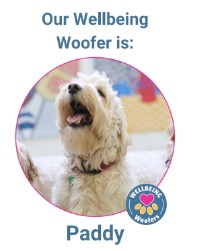 ive in school on a Friday. The Wellbeing Woofer sessions enable children to have close contact with a dog, play games, learn how to groom and care for a dog, boost their wellbeing and express their emotions with their new furry friend. Paddy is going to be at school on Friday mornings. He will be welcoming the children on their way into school and then working with classes, small groups and individual children.
ive in school on a Friday. The Wellbeing Woofer sessions enable children to have close contact with a dog, play games, learn how to groom and care for a dog, boost their wellbeing and express their emotions with their new furry friend. Paddy is going to be at school on Friday mornings. He will be welcoming the children on their way into school and then working with classes, small groups and individual children.
The Harlequins Foundation Buckingham Primary School works with the Harlequins Foundation t o deliver programmes that support young people to develop essential skills and wellbeing, enabling success on and off the pitch.
o deliver programmes that support young people to develop essential skills and wellbeing, enabling success on and off the pitch.
The Harlequins Offer at Buckingham last year:
Harlequins METTLE Schools Programme
The METTLE training is designed for primary schools and uses resources and the experience of The Harlequins Foundation to raise awareness and challenge the stigma of mental health, while developing mental resilience in young people to develop the Essential Skills staying positive and aiming high.
Harlequins Tag Rugby Lessons and After-School Club
This training has been designed by the Harlequins (Rugby) Foundation and is a wonderful opportunity for our pupils to develop new skills in a fun, engaging and supportive environment. The sessions will be delivered by a trained coach who will draw on skills and experiences on and off the field to help pupils develop not just their rugby skills but also resilience, confidence and teamwork.
KOOTH
Kooth is a free, confidential online mental health support platform designed for young people aged 10 to 25. It provides a safe space where students can access professional help, peer support, and a variety of self-help resources. Available 24/7, Kooth allows users to engage with mental health professionals via chat, read articles on wellbeing, and participate in moderated forums where they can connect with others facing similar challenges.
users to engage with mental health professionals via chat, read articles on wellbeing, and participate in moderated forums where they can connect with others facing similar challenges.
Kooth is an invaluable resource for promoting emotional resilience, helping students navigate life's difficulties with guidance and support tailored to their needs. With its user-friendly, anonymous interface, Kooth ensures that young people have access to the help they need in a way that is comfortable and non-intrusive






